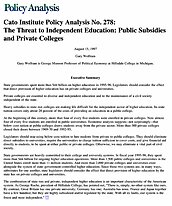State governments spent more than $44 billion on higher education in 1995–96. Legislators should consider the effect that direct provision of higher education has on private colleges and universities.
Private colleges are essential to diverse and independent education and to the maintenance of a civil society independent of the state.
Heavy subsidies to state-run colleges are making life difficult for the independent sector of higher education. In-state tuition covers only about 28 percent of the costs of providing an education in a public college.
At the beginning of this century, more than four of every five students were enrolled in private colleges. Now almost four of every five students are enrolled in public universities. Economic analysis suggests–not surprisingly–that below-cost tuition at public colleges draws students away from the private sector. More than 300 private colleges closed their doors between 1969–70 and 1992–93.
Legislators should stop using below-cost tuition to lure students from private to public colleges. They should eliminate direct subsidies to universities, require the universities to charge tuition sufficient to cover costs, and give financial aid directly to students, to be spent at either public or private colleges. Otherwise, we may eliminate a vital part of civil society.
About the Author

This work is licensed under a Creative Commons Attribution-NonCommercial-ShareAlike 4.0 International License.
